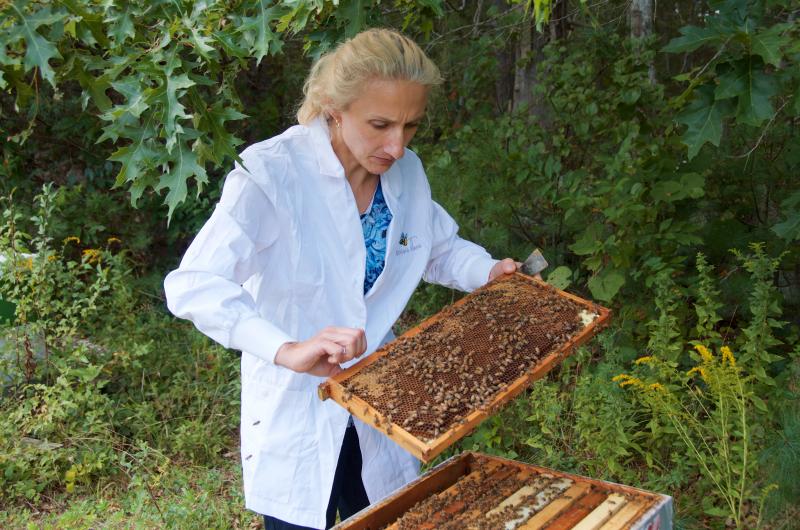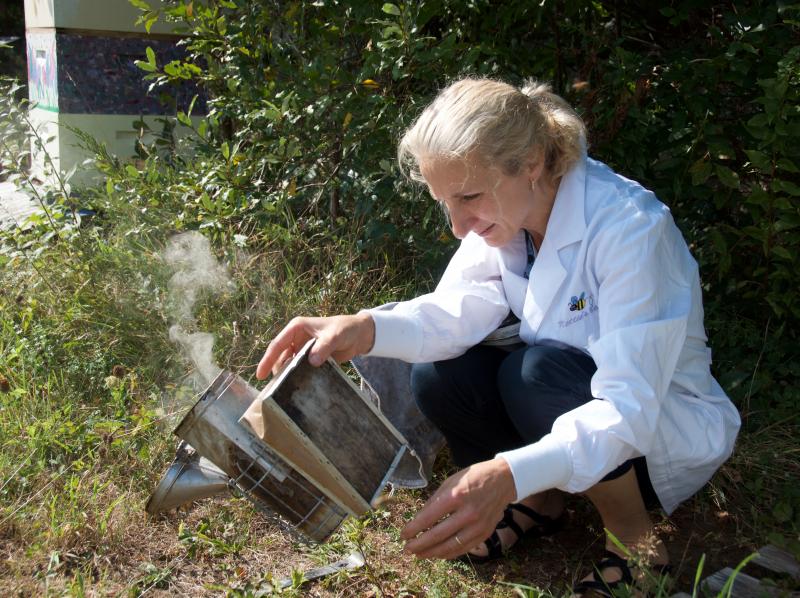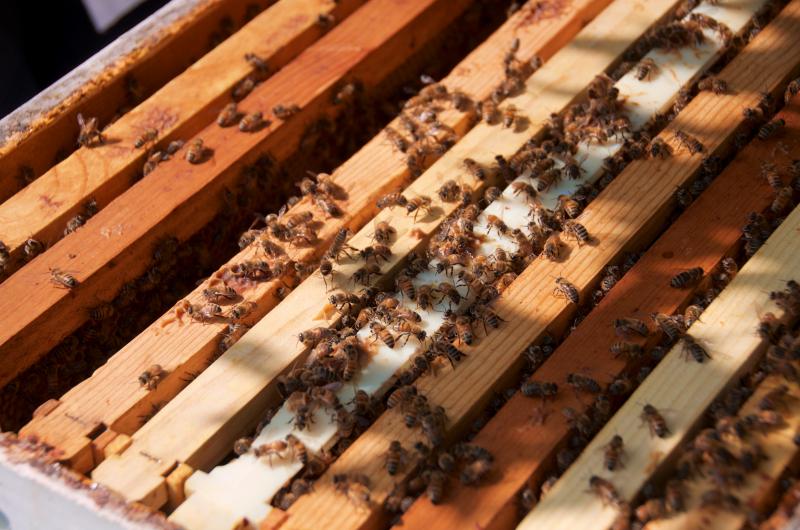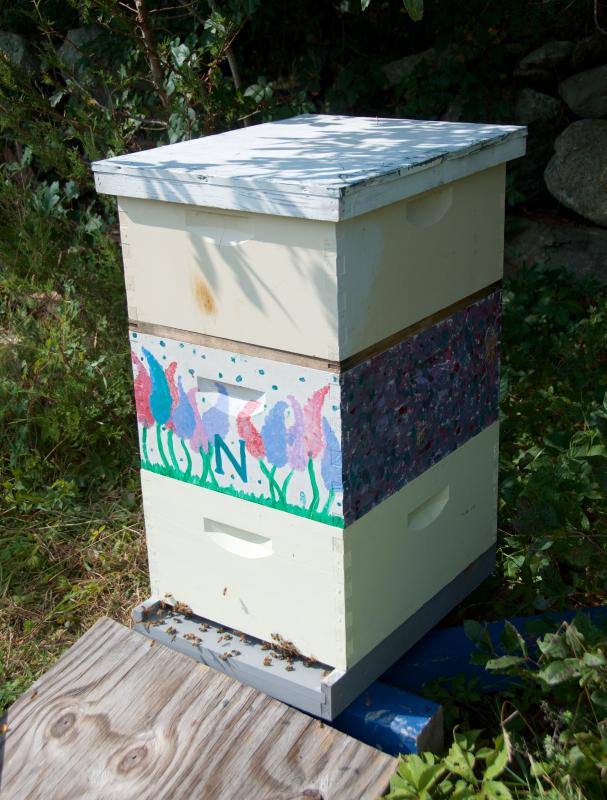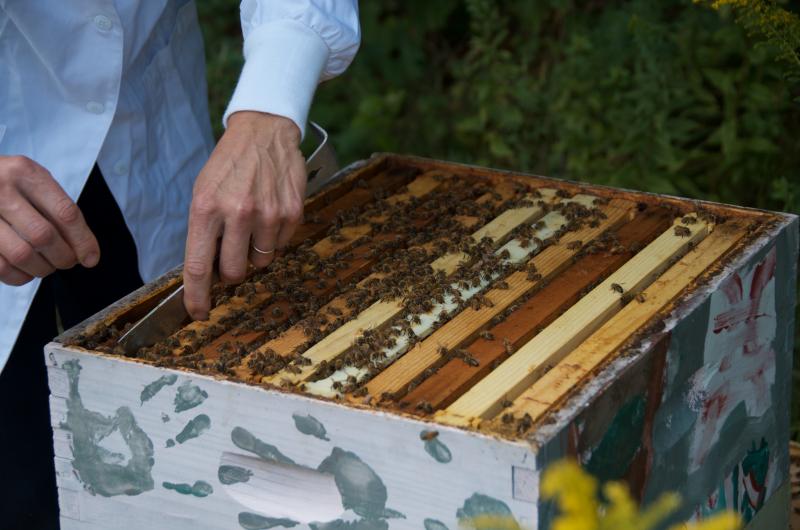Lithuanian-born beekeeper finds herself at home with hives
Nettie Hopkins is a fearless beekeeper. On a sunny Friday afternoon, she opens up one of her hives near her Rochester home without a bee suit, a netted hat or even a pair of gloves.
“I’ve been around bees my whole life,” she says.
A Rochester resident, Hopkins’ says bees have a long history in her native Lithuania.
“They’re part of our culture. We have a lot of folk songs about bees,” Hopkins said. “We have a bee museum, bee tours – anything about bees you can find in Lithuania.”
Hopkins’ family kept several bee hive,s and she would help her father check on them and harvest their honey as a girl. She later attended an agricultural university and wrote her bachelor’s thesis on Lithuanian honeybees.
“I think bees found me naturally,” Hopkins said.
After graduating, she decided to study abroad for a year in the U.S., intending to return home after the year was up. Instead, she met her husband Tom, a native of New Bedford. They got married and eventually moved to Rochester where Hopkins started her own hives.
“Rochester is very close to how it looks in Lithuania,” she said. “It makes me feel very homey here.”
The Hopkins’ home overlooks a large field where the beekeeper has four of her hives. The rest, 40 in total, are in several local cranberry bogs, ones where the growers agree to use bee-friendly pesticides or to spray when the bees are safely in their hives at night.
Although tiny cranberry flowers do not lead to a high yield of honey, Hopkins has a harvest of about 1,800 pounds a year. Her family, Tom the “bee manager” and her kids, Will and Kristina, both students at Old Rochester Regional High School, help with the work, though they tend to stay away from the hives.
“I don’t understand why they’re so afraid of bees, but they’re getting better,
said Hopkins. “Not everybody likes bees crawling around on you.”
Hopkins, who works full time at the pharmacy at the Wareham CVS, said keeping so many bees is time consuming. She checks them for mites, to make sure they aren’t swarming, monitors honey production and the general health of the hives. With help from her family, she also harvests all her own honey, running it once through a sieve. Unlike some honey that has been heated, all of Hopkins’ honey is raw, which is necessary to preserve its medicinal and antibacterial properties, she said.
Hopkins sells some of her honey, but it’s also a staple in her household.
“In my house, I don’t have sugar. If I make pancakes, anything that requires sugar, we put honey on it,” she said.
No matter what the seasonal variations in flavor and color, “They all taste wicked good,” said Will.
And although her kids may not be eager to cozy up to a hive, they are appreciative of the bees.
While out cross country skiing in the winter, Hopkins' daughter discovered one of the bees frozen in the field.
She brought it back to the house to see if they could save it.
“We gave the bee a little honey,” said Hopkins. “She started to craw, and we went and put her back in the hive.”
It's clear that to Hopkins, the bees are much more than honey producers.
While some people grow attached to their horses or cats, Hopkins said, “Bees are my pets. I do find them amazing. They always challenge you. I love working with them.”
Hopkins sells her honey under the name Nettie’s Bees. It can be found at How On Earth in Mattapoisett, the Ansel Gurney House in Marion and, on Fridays, Saturdays and Sundays through October at a stand on Mendell Road near Shadow Farm Lane in Rochester. For more information, email tritownhoney@gmail.com.



